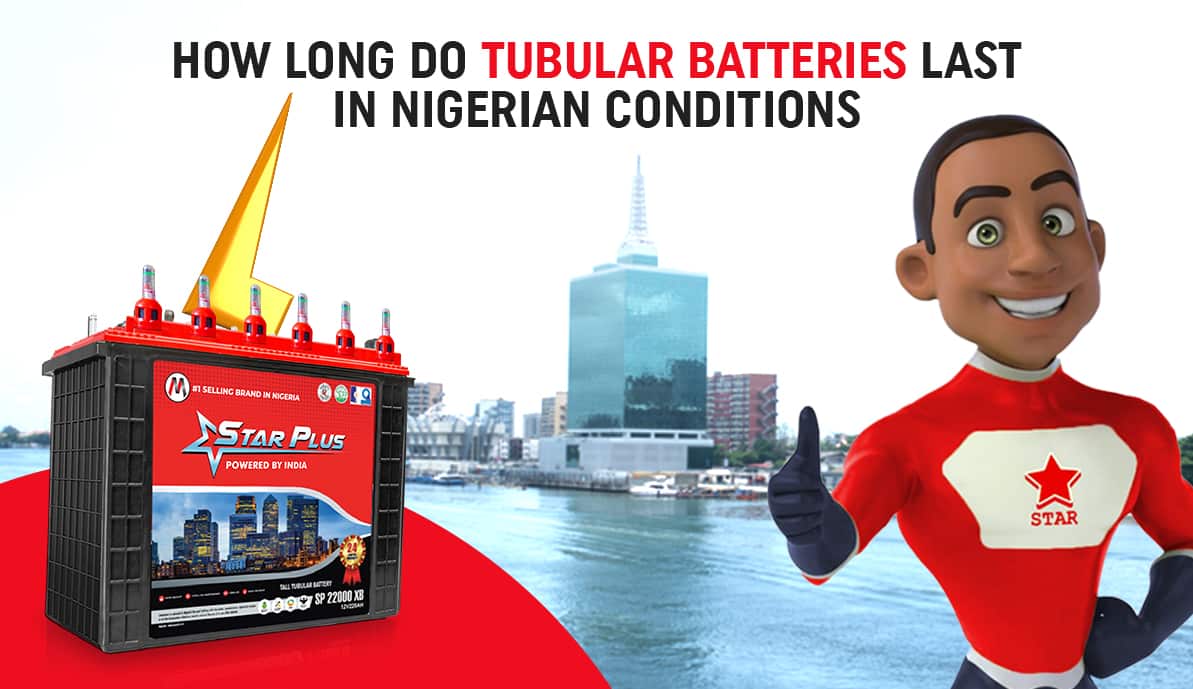Tubular batteries have become a popular choice for inverters used in homes across Nigeria. When sudden power cuts occur, all we rely upon is a power backup that can save us. Choosing the correct inverter battery is no longer a luxury; it has become a necessity in many Nigerian homes.
But how long do tubular batteries last? That’s a common question we get from our clients. As the power backup becomes more reliable, many customers purchase any tubular battery without checking its capacity.
At Star Plus Battery, we care about your energy reliability. Check out this blog to learn about the lifespan of tubular batteries in Nigeria and discover ways to save more energy.
How long does a tubular battery last?
To know how long do Star Plus inverter battery lasts, kindly calculate using this formula:
Backup Time (in hours) = Battery Capacity (in Ah) × Input voltage (V) / Total Load (in Watts)
Here is an example.
Let’s assume that your inverter battery has a capacity of 220Ah. Also, the input voltage is 12 Volts.
Now, if you connect a lot of appliances, let’s say a total of 500 Watts. The Backup time will be 220 × 12 ÷ 500. That gives us 5.28 hours.
Such an inverter battery will last for 5.28 hours. But that’s only in theory. In real-life practice, the actual value will be slightly lower due to power loss.
Inverters are not 100% efficient. However, on average, a good inverter battery should have a power efficiency of 85-95%. The higher the inverter efficiency, the longer the power backup time will be.
How many years does a tubular battery last in Nigeria?
Our tubular inverter batteries last for 4 to 5 years. To reduce power consumption more efficiently, we offer our customers a 24-month warranty period. Tubular battery durability depends on certain factors involving:
- Nigerian climate, especially with harsh conditions.
- Frequency of power cuts
- Depth of discharge
- Quality and compatibility of the battery with the inverter and charging system.
- Regularly check water levels.
- The usage pattern of your battery
- Storage and maintenance are used for an inverter battery
Do tubular batteries perform well in hot weather?
Yes, our tubular batteries perform well in hot weather conditions. Due to the advanced design and high-performance capabilities of our tubular batteries, Nigerian homes can receive power even in the hottest weather.
Water scarcity is a significant concern in Nigeria, particularly during the summer months. Due to this concern, we have incorporated an in-built electrolyte level indicator into our tubular batteries. This indicator helps measure electrolyte levels in each cell, making maintenance easier.
Additional fluidic headspace above the battery plates increases the wearing intervals and lessens the requirement for frequent topping up.
Which battery lasts longest in Nigeria?
Tall Tubular Batteries have the best inverter battery life in Nigeria. However, the best tubular battery is subjective and depends on your power needs, budget, and outage history. In many cases, heavy-duty tall tubular batteries will be a better option than most other alternatives, given the Nigerian climate and power conditions.
Our tubular inverter batteries offer good performance, value, and quality for Nigerian homes and businesses. Whether you are replacing, upgrading, or buying for the first time, investing in a reliable brand like Star Plus Battery would be a wise decision.
How to extend tubular battery life in Nigeria?
Power backup usage has significantly increased over the years. In return, is your tubular battery durable enough? Here are some of the best tips to extend your tubular battery life:
- Proper installation of the battery by checking plug-ins and inverter connections.
- Regular maintenance includes checking electrolyte levels, inspecting for rust deposition, and monitoring body heat.
- Maintain a balanced charge in your batteries, avoiding both overcharging and undercharging.
- Monitor power capacity and output to measure any faltering in the performance.
- Do not mix different types of batteries; choose one and maintain that.
- Only use distilled water to top up your inverter batteries.
Conclusion
Understanding how long a battery can power is essential to adjust total power consumption. At Star Plus Battery, we provide our customers with tubular batteries that power multiple electrical appliances.
Are you having any problems with your inverter battery? Connect with us today. For other queries, leave your comments below.



0 Comments